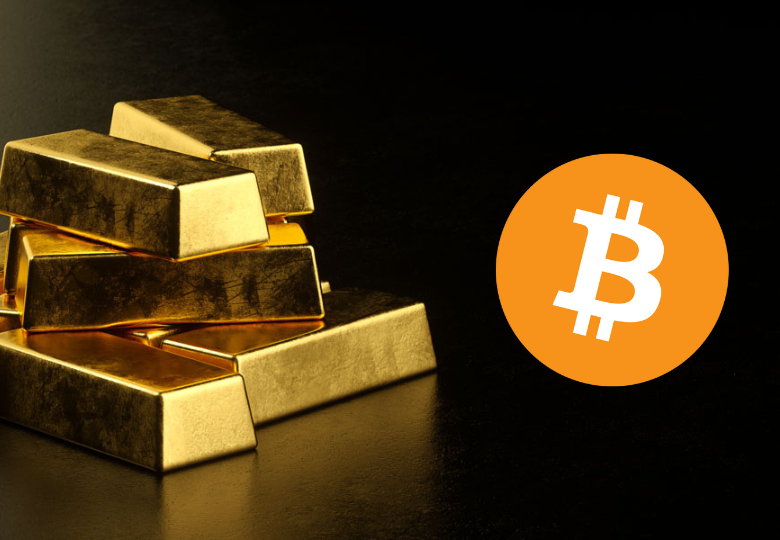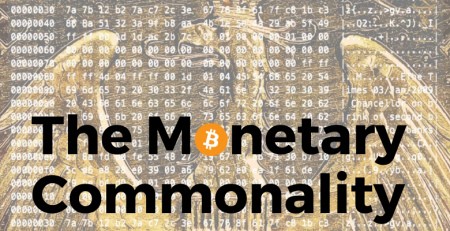Bitcoin versus Gold
“A real comparison between gold & bitcoin is to compare their relative ability to alleviate uncertainty”
The definition of the word “money” has been reduced to a circular empirical question of “what do people use as money?” The subjectivity of the answers has led to whole taxonomies and spectrums of “moneyness”. Rather than completely surrendering the term to subjectivism, economists have developed objective criteria for evaluating what people use as money such as liquidity, saleability, or marketability. This consequentialist approach can be summarized as: money is whatever good is currently employed for the most instant satisfaction of the widest range of possible needs.
This definition could be further summarized as “it depends”, since the ‘Whatever Good’ changes depending on where and when the evaluation is performed. This is particularly problematic when the question is “what will be the most liquid good in the future?” or “will Whichever Good eventually out-compete Whatever Good in the market process of accruing liquidity?” These are entrepreneurial questions, subject to error, but the consequentialist definition of money does not provide even a framework for answering them. We end up with the tautology of “if Whichever Good becomes the most liquid, it will be money”, only raising the question of “what properties or human actions will cause it to accrue liquidity?”
There is an alternative to the above consequentialist definition. The deontological definition of money. It begins by asking the most controversial question in economics: “what is the utility of holding money?”
Answers generally fall into two categories: money has zero or negative utility until you spend it or money has positive utility until you spend it. The first category is easy to refute: if holding money lacked utility then people wouldn’t do it. The second category calls for further elaboration.
What is the positive utility from holding money?
The most obvious positive utility from holding money, perhaps the one most familiar to holders of Bitcoin, is the “real” yield of expecting an increase in the general purchasing power of the monetary unit held. This can not be the only utility of holding money, otherwise there would be nobody willing to hold fiat monies that promise a negative speculative yield.
Another positive utility from holding money is the practical convenience of having cash in your wallet or in your business’ till. This utility also seems insufficient, as credit cards have proven themselves to be often more convenient for consumers and merchants than paper bills.
The fundamental utility of holding money is via negativa: that you are not holding a consumer good or a producer good. This abstention has utility in two parts: one is the optionality to trade for a consumer or producer good in the future (“medium of exchange”) and the other utility is the reduced uncertainties intrinsic to holding the monetary asset relative to holding a consumer or producer goods (“store of value”).
These two utilities of holding money are prospective and speculative, and thus subject to entrepreneurial error. Perhaps a future trading partner will actually want to barter, or perhaps the monetary asset will suffer from an uncertainty that spares a producer good. In addition, the anticipated reduction in uncertainty is inherently subjective, each individual having their particular psychology and set of circumstances. By definition uncertainty is unknowable and unquantifiable, so there is no “correct” estimate of how much money someone ought to hold.
Sadly, the medium of exchange utility is the same tautology we identified in the introduction, so we are left with one distinct non-circular utility of a monetary asset: having less fundamental uncertainty associated with holding the asset. Since you can’t hold an asset without first receiving it, and you can’t receive it without someone else sending it, the relative uncertainties associated with transferring the asset are equally relevant.
Minimizing relative uncertainty is the most important utility of a monetary asset because people rely on cash balances to hedge against the widest range of future uncertainties. Given Bitcoin’s volatile exchange rate it is particularly worth noting that hedging against price risk can be done with (self-)insurance, whereas by definition uncertainty is uninsurable because it does not have actuarially quantifiable probabilities. Through the lens of minimizing uncertainty, the rubric by which we judge which asset is most suitable to be held as money has no overlap with our judgements of assets for consumption or production.
To illustrate the concept of uncertainty minimization, we’ll compare gold with Bitcoin. We’ll start with how these two assets can be stored and the uncertainties associated with just holding them.

Bitcoin versus Gold
First we have to recognize that at worst Bitcoin private keys have the same uncertainties as gold, since you can engrave your private key in gold but the inverse is not true, you can not store gold in your private key. However, Bitcoin private keys on their own are useless without valid UTXOs to sign for, so the reliance on software, a network, and the game theory of Nakamoto Consensus does contribute to Bitcoin’s uncertainty.
Where Bitcoin really shines in minimizing uncertainty in storage is the wide range of storage options it offers to users. A Bitcoin private key is just information, de-materialized zeros and ones, and more practically 12 or 24 words. It can be stored in a hardware wallet, written down, stamped, engraved, and encrypted. In the best case scenario, it is impossible for an attacker to brute-force access the private key, and as such, it is inaccessible if you are dead. This stands in stark contrast to gold, where there is always a brute-force means of accessing the bullion. Gold’s vulnerability to physical seizure led to its centralization in large government vaults.
Beyond de-materialization, the magic of cryptography enables people to hold the keys giving them access to the Bitcoin in multiple different locations simultaneously with multisig. Instead of being locked to a contract asking for one signature from one private key, the contract can ask for signatures from any number of private keys, for example 2-of-3 or 3-of-5. This redundancy removes single points of failure and enables multi-jurisdiction holding of bitcoin, which is impossible with gold. The cryptography of digital signatures and multisig reduce the uncertainty associated with holding Bitcoin far beyond what can be achieved with physical gold vaults.
Before you are holding bitcoin, you have to receive it. Here too, Bitcoin has fundamentally less uncertainty relative to gold. The uncertainty with gold is whether or not you are receiving real gold. Verification of odd sized gold dust and nuggets was too costly, so coin minting emerged. Mints are centralized manufacturing facilities so they were seized by sovereigns who then proceeded to debase the coins to earn seigniorage revenues. Parlor tricks of dropping a coin for a unique auditory signature do not help in verifying 99.9% versus 91.6% gold fineness. Only an assay and sonogram can properly verify gold. In practice this is too expensive, so it is common to leave your gold within the network of vaults certified by the London Bullion Market Association (LBMA), trusting a third party to avoid the cost of verifying every gold transfer.
The cost of verifying that you received real bitcoin on the other hand, is negligible. You just need to run free open source node software on a computer. It is also highly scalable, the marginal cost of verifying an additional one of your transactions is unnoticeable, regardless of the value of the bitcoin received. Furthermore, the level of uncertainty minimization achieved is far greater than gold verification, as you are not just verifying that you received bitcoin, you are also verifying the total supply of bitcoin, giving you the peace of mind that you own a fixed percentage of the 21 million bitcoins. You don’t need to rely on a third party to tell you that you have real bitcoin, nor your proportion of the whole – it’s cheap and easy to do it all yourself.
Bitcoin’s consensus parameters, the rules of the protocol, are also optimized for minimizing uncertainty. Resource usage constraints like the block size limit and signature operations limit put a ceiling on the growth of cost for syncing a new node and keeping an old one online. The upgrade mechanism for Bitcoin’s smart contracts has respected backwards and forwards compatibility, so that users can continue to use their old node software and only need to opt-in to new features as needed.
In Closing
Bitcoin has low costs and high benefits of storing and verifying, so why do so many people leave their bitcoin with third parties?
The primary reason is a lack of familiarity with how to use the Bitcoin system and private keys. The passage of time will lead to greater decentralization, as people come to understand the ease with which they can control their own money and suffer the consequences of not doing so.
Time is on Bitcoin’s side, whereas time reveals gold’s weaknesses, with people trapped between the high cost of verifying and storing gold and the high cost of trusting third parties.
If you want to send your gold, you have to pay for an armored car and insurance as well as wait for weeks for it to move. Again it is more cost effective to rely on centralized vaults and internal transfers between them. Bitcoin’s transaction fees have been volatile, but they have consistently been less than the cost of a cup of coffee. While gold’s cost of transportation scales as a percentage of the value of the gold being transported, transaction fees in Bitcoin scale based on the amount of data a transaction consumes. This means that a Bitcoin transaction may be moving tremendous value while paying the same fee as a similarly sized transaction moving a small amount of value. Furthermore, for small value transfers people can use Bitcoin’s Lightning network which does charge routing fees based on a tiny percentage of the value being transferred. The uncertainty experienced when sending Bitcoin is far less than the uncertainty associated with sending gold.
You can track your transaction from your wallet, to your node’s mempool, to the next block very easily and all without trusting a third party.
Bitcoin’s open source software is scalable and upgradable, enabling its users to affordably control their own money, whereas gold’s physicality makes its use only affordable to State actors who can subsidize its security. This disparity explains why we have not seen the emergence of money-substitutes that are not 100% backed by bitcoin, whereas fiduciary media rapidly developed for gold and degenerated into pure fiat. Providing a technological solution to the problem of fractional-reserve banking is an unexpected benefit of Bitcoin having better properties than gold.
From the perspective of a speculative entrepreneur, Bitcoin may be the best candidate for completing a monetization trajectory to become the global currency. We see it work through the volatile market process as imperfect humans learn about it in waves, come to appreciate its properties and take their place in the UTXO set. Hopefully future generations will have less difficulty answering the question “what is the utility of holding money?”
Pierre Rochard
September, 2022
The opinions expressed in this publication are those of the author, and not of the author’s employer or affiliates. This publication is for general informational purposes only and should not be relied upon by any person in connection with any investment decision or otherwise. This publication does not contemplate individual circumstances and it is not investment advice, nor should it be construed in any way as tax, accounting, legal, business, financial or regulatory advice. You should seek independent legal and financial advice, including advice as to tax consequences, before making any investment decision.








